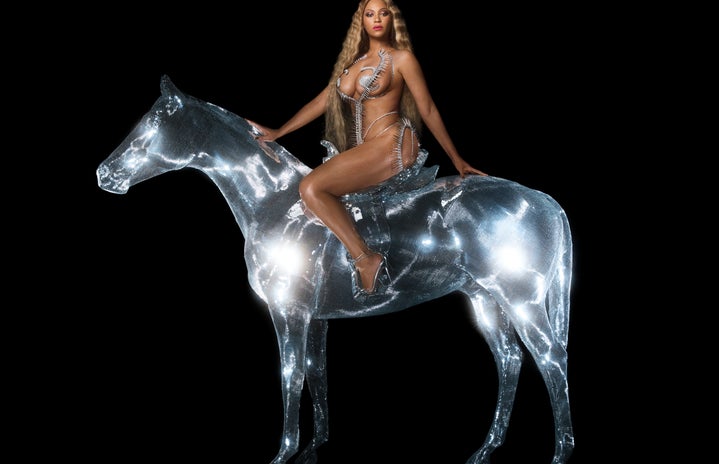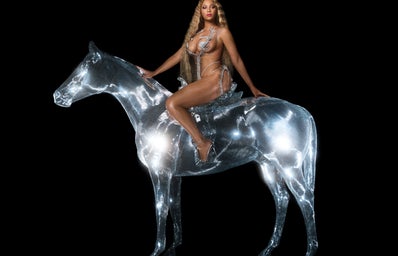They used to say I spoke, ‘Too country’ / Then the rejection came, said I wasn’t, ‘Country enough’ / Said I wouldn’t saddle up, but if that ain’t country, tell me, what is?” Beyonce sings on Ameriican Requiem.”
Direct from her recent Instagram post to build up her upcoming album “Cowboy Carter,” she states, “it was born out of an experience that I had years ago where I did not feel welcomed…and it was very clear that I wasn’t. But, because of that experience, I did a deeper dive into the history of Country music and studied our rich musical archive.” Referencing her 2016 CMA performance of “Daddy Lessons” with The Chicks, a country-influenced cut from “Lemonade,” which was met with disdain from country fans claiming she was “infiltrating” the genre.
As a Texan raised by a Creole mother from Louisiana and a father from Alabama, Beyoncé has always been country.
Today, country music has become synonymous with white conservatism. The true history of country music has been buried by the current pop-country scene, but with “Cowboy Carter,” the historical roots of true country music have been uncovered.
Nadine Hubbs, a professor at the University of Michigan, further explores the cultural intersections that shape country music, particularly in borderland communities like those in California and Texas. Her research emphasizes the deep-seated influences of Mexican and Indigenous cultures on Western aesthetics, from music to fashion, showcasing the rich and diverse heritage that influences the genre.
Country music’s roots also include significant contributions from Black culture, most notably the banjo. Time elaborates on how the banjo, originally rooted in West African lutes, was later standardized and popularized among white audiences through minstrel and blackface performances, ultimately shaping the evolution of hillbilly music into what we now know as “country music.”
In Beyoncé’s “Texas Hold ‘Em,” the banjo is expertly played by Rhiannon Giddens, a respected musician known for her exploration of Black heritage in music. Giddens collaborated with other Black female artists on the project “Songs of Our Native Daughters,” which delves into African American stories and the history of the banjo. “Texas Hold ‘Em,” became the first country single by a black woman to debut at No. 1 on Billboard’s Hot Country Songs chart.
Beyoncé includes a song called “Flamenco” on “Cowboy Carter,” continuing to tap into the history of country music. Flamenco, a traditional Spanish art form, adds yet another layer of cultural diversity to Beyoncé’s repertoire. With this track, she not only pays homage to the roots of country music but also embraces the fusion of different musical traditions, showcasing her versatility as an artist, with classic Spanish guitar incorporated into this track backing her angelic vocals.
Most notably, Beyoncé collaborates with emerging artist Tanner Adell on a rendition of the Beatles’ “Blackbird” from the iconic White Album. This choice isn’t arbitrary; Paul McCartney revealed that he drew inspiration from the civil rights movement of the 1960s, interpreting “bird” as British slang for girls and the overall title symbolizing young Black women. Beyoncé’s reinterpretation of the song is more than just a duet; she gathers a small choir of featured artists, including Brittney Spencer, Reyna Roberts, and Tiera Kennedy, abandoning her typical backup vocal stacking. This collaboration not only benefits from Beyoncé’s influential endorsement but also delivers a sublime musical experience.
Beyond showing the racism Black artists face through the music, Beyoncé donned a red-white-and-blue sash with the caption “act ii BEYINCÉ,” subtly referencing her maternal lineage and family history.
Tina Knowles-Lawson, Beyoncé’s mother, said back in 2020 that the origin of Beyoncé’s name was from her maiden name, Beyincé. Beyoncé derived from the hospital misspelling the name on Knowles-Lawson’s birth certificate, due to the lack of care for Black people around Knowles-Lawson’s childhood. These insights into her personal background underscore the significance of her cultural identity and its impact on her musical endeavors.
Through both personal experiences and scholarly insights, the narrative of Beyoncé’s journey into country music emerges as a complex and multifaceted exploration of identity and heritage.


